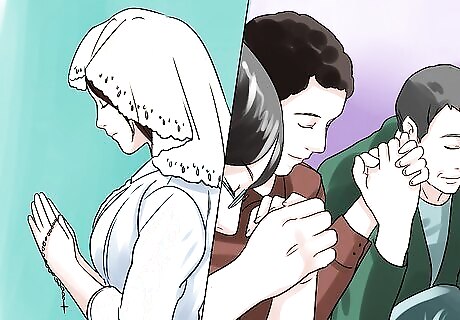
views
Choosing a Church

Find local churches in your area. You can go about selecting a church in a number of different ways, depending on your history with religion and what's available in your area, but it's important to find a church that's close and convenient so you can feel like part of the community. Most people have some sense of their beliefs, but many people are also interested in exploring what's available locally. You shouldn't have to travel far to go to church. Start local. If you're an Episcopalian, find out what Episcopal churches there are in your community and attend all of them to pick which one fits you best. If you weren't raised with any belief system and want to explore your options, find out the variety of different churches and religions practiced in your town and make a few visits. Do some reading about them to find out if they line up with your personal beliefs, then explore them at a service as a visitor.

Do a little research beforehand to find out what to expect. If you live around the corner from an Apostolic church, it may be convenient to attend, but it may also be very different from what you're used to at other Christian churches. On the other hand, it may fit in perfectly with your personal beliefs and needs for a religious practice. Do some reading on the beliefs and practices of the religions before you attend to help you narrow your search for a church community. You don't need to be an expert about religion to go to church. Most church-goers are excited and friendly, happy to welcome new potential members and visitors to their service. Church is supposed to be a learning experience, so don't let your ignorance of a particular religion keep you from attending. Keep an open mind and open heart.

Don’t be afraid of the smaller church communities in your area. In larger towns and increasingly in rural communities, mega-churches with large memberships and parking structures are increasingly common. While these appeal to lots of believers because they are easy to attend, it can also be somewhat difficult to get to know anyone at your church if you're attending a service in a sports arena. Try out smaller churches to see what works. Give both a shot. If you're a member of a small community church with a broken-down organ, you might try exploring a larger church with bigger production values to see if it helps you engage more. Alternatively, you might be able to get in touch more profoundly at a simple, humble, country church.

Try out a few before you settle on one. Even if you're fairly settled on your religious preferences and your desires for a church community, try exploring your options as a learning experience. There might be something better out there for you, something that feels right and comforts. If you know definitively that you’re a Christian, or a Muslim, or a Sufi, it’s still important to explore the different churches within that religion in your area to find one that feels comfortable. Fellowship is just as important a part of worshiping at a church as the tenants of the religion itself.
Attending Your First Service

Go in with an open mind. "Going to church" comes with many connotations for different people. Try to forget about the judgmental old ladies you remember from your youth, or the intimidating incantations from the strangely-dressed man at the front of the room. If you've never been to church, try to check what you may have heard at the door. Go in with an open mind and a curious attitude. If you used to attend church and haven't attended recently, all the more reason to explore the options available to you and see what else is out there. Try to leave your preconceptions at the door.

Dress up, a little. It's generally customary to wear nice clothes when attending churches of all kinds. Some religions have more lenient dress codes, while others are quite formal. If you're curious about the dress code at a particular church, call ahead and ask, or play it safe and wear something nice. Many churches have no requirement for clothes, but it’s usually still a good idea to put on nice, clean clothes when you’re attending church for the first time. A three-piece suit or a formal gown isn’t necessary, but at least avoid flip-flops and cargo shorts.

Go with other people. It can be intimidating to go alone, so bring support with you if you'd rather go with others. Make it easy on yourself and ask some friends that are experienced churchgoers to help guide you through the process, or go along with other friends or family members who've never attended before either. Make it a group experience and discuss it afterward.

Try to talk to some members. Generally, the members of most churches will be excited to welcome you and will want to talk to you. You don't have to make best friends on your first day, but it's usually a good idea to try to meet a few members, giving yourself an opportunity to ask questions, find out more about the church, and get some sense of the community there. If you want to know something, just ask. If you're going alone, try to find someone to sit with, or chat up your neighbor. At many churches, there's even a brief period of greeting your neighbor built into the service, where everyone should shake hands or embrace their neighbors.

Pay attention and follow the lead of others. Different church services will work in different ways. There may be singing, call and response, group prayer, or kneeling. The service may be quite loud and joyful or quite solemn. It's hard to know what you'll get before you attend, but try not to worry too much about doing everything perfectly. Others will help guide you through the process. Don't do anything that makes you uncomfortable, or that you feel you're not ready for. At some Christian churches, for example, taking communion is a common part of some services, but shouldn't be taken by unbaptized Christians, or visitors. It's perfectly fine to attend these churches, however, and not take part in communion.

Pay attention to how the service makes you feel. Are you made to feel comforted at this church? Do you feel welcome? Does this seem like the kind of place you'd want to return to worship? If so, you might consider joining the church. If not, don't be discouraged. This doesn't mean that religion isn't right for you, it just means that this church might not be right for you. Continue your search. Listen closely to the sermon given, or the message in the service. Does it fit in with your own personal conceptions of this religion? Does it challenge your notion of the big questions, or does it validate it? Depending on what you're looking for in a church, you might have a variety of different responses. Don't be afraid to give weight to the little things. Does the dress code fit in with your own personal style? Do the people seem friendly and nice, like the kind of people you want to know? Is the coffee good? Perfectly valid questions when considering churches.
Taking the Next Step

Talk to someone about joining the church. If you've found a church that you really enjoy attending, go a few times as a visitor, and then consider joining the church. Depending on the religion and the church itself, there may be any number of different tasks required of you, including formally converting religions, but the process will vary from church to church. Usually, you'll want to get in touch with the pastor, minister, or preacher at the church you're attending and express your interest in joining. You'll likely be asked some questions and given a path toward joining.

Don't be afraid to ask questions. If anything about the experience of going to church confuses or frustrates you, make time to speak about your concerns and ask those questions in private with a member of the staff. Church is social, but it's not just a club for fun. You're likely going in search of answers to big questions you have about the nature of life and existence, so don't be afraid to ask those questions.

Consider going to study services or other classes. Many churches have separate classes or small-group activities that you should feel free to attend as much as you want. Sometimes, these will meet immediately before or immediately following the service itself, but at some churches these meetings will occur at different points throughout the week. If you're curious about the options, speak with the staff and find out what's available. If you're not interested in in-depth study of religious texts, feel no pressure to attend. Attend the services you want and avoid the ones you don't.

Volunteer your time. Churches run on the volunteer work of people like you. Passing out pamphlets, collecting donations, running the youth groups: these are all tasks that require volunteers. Even helping people park cars and greeting people at the door requires volunteers. If you feel up to it, after joining a church, consider volunteering for some responsibilities. Give back. At some churches, it's common to donate some money to the church each month, usually a certain percentage of your paycheck. It's not about amount, it's about giving a little portion of what you have to the church to keep it running smoothly and providing the service that you appreciate.

Consider going on missions or regional trips. Many churches make a priority of taking their message and their practice on the road, organizing mission trips or visits to regional conferences, where many congregations of believers will gather in a certain spot. If you attend a very small church, this can be an excellent way of meeting like-minded believers from far-off places, where you'd be unlikely to meet them otherwise. If you have a great experience at your church, it's also sometimes a good idea to invite others you think might benefit from visiting your church. Spread the word.



















Comments
0 comment